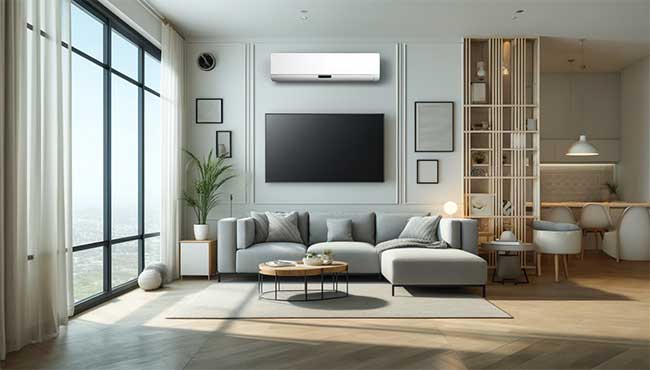
In the dynamic and often harsh climates across Australia, an effective and efficient air conditioning system is a must for maintaining year-round comfort.
Whether battling summer’s stifling heat or fighting off the wet chill of winter, a reliable AC system keeps your home feeling like a sanctuary. But just how much climate-controlled comfort is your air conditioning system likely to provide you?
Let’s explore the many factors that influence how long your AC system can effectively cool and heat your home. Knowing this information will help you to make informed decisions about maintenance, repairs, and eventually, replacement.
Understanding Air Conditioning Systems
If you’re installing a new air conditioning system in your home, or replacing an existing setup, the first step in making an informed choice is to know which type of aircon system you want.
In Australia, homeowners typically choose from one of several types of air conditioning systems, each suited to different needs and home layouts.
- Split systems consist of an outdoor unit and one or more indoor units, and are popular in apartments and smaller homes due to their ease of installation and operation.
- Ducted systems are ideal for larger homes as they can cool multiple rooms simultaneously through a network of ducts hidden in the roof or floor. However, they do involve a more complicated installation process.
Evaporative coolers and portable air conditioners are also highly popular. Knowing how these systems work is key: each draws warm air from your home, cools it, and redistributes it to achieve a comfortable indoor temperature.
Longevity by Type: How Long Different AC Systems Last
When you’re considering which type of air conditioning system to install in your home, knowing the average lifespan of each option can be highly valuable. Here’s a breakdown of average lifespan figures for various AC systems commonly used in Australian homes:
- Ducted air conditioning systems: These systems typically have a lifespan of 15 to 20 years. They’re specifically designed for long-term performance.
- Split systems: These are expected to last about 10 to 15 years. Split systems are popular in smaller homes and apartments due to their compact size and ease of installation.
- Evaporative coolers: Highly regarded for their eco-friendliness, these systems usually last anywhere from 15 to 25 years, depending on maintenance and climatic conditions.
- Portable air conditioners: Generally, portable units have the shortest lifespan, ranging from 5 to 10 years. Their longevity often depends on how frequently they get moved about and used.
Knowing the average lifespan of your air conditioner can help you plan for future maintenance and replacement. It will ensure that your home remains comfortable without unexpected disruptions or costs.
Factors Affecting Lifespan
Several factors can influence the lifespan of your AC system.
- Firstly, the quality of installation is crucial. A poorly installed system can suffer from inefficiencies that prematurely wear out its components.
- The system make and model also dramatically affect longevity, with well-regarded brands typically offering more durable units.
- Environmental conditions bear a major influence as well. Systems in coastal regions may break down faster due to salt corrosion, while those in urban or dusty environments might encounter more contaminants.
Cyber Air Conditioning states that regular professional servicing can reduce these effects, and in doing so, prolong the life of your system.
Importance of Regular Maintenance
One of the most effective ways to reduce the risk of AC problems that lead to costly repairs or a system replacement is to maintain a regular servicing schedule. Basic tasks such as cleaning your air conditioner or replacing the air filters every few months can go a long way towards improving its efficiency and air quality.
Regularly scheduled inspections from a licensed technician will make sure that all components remain in good working order and free from debris. This proactive approach extends the life of your AC and ensures it works at maximum efficiency.
Signs of Ageing in AC Systems
As your air conditioning system ages, several signs can indicate it’s reaching the end of its natural lifespan.
Rising energy bills often suggest your system is losing efficiency and working harder to maintain the comfort level you’re used to. Frequent breakdowns and the need for repairs are common red flags that components are wearing out.
If your system struggles to keep a consistent temperature or begins to make unusual noises, these can indicate internal issues. Finding moisture or leakage around the system is another critical indicator. Addressing these initial indicators ASAP can prevent more significant problems and help you decide when to replace your system.
When to Consider Replacement
Professional repairs can certainly help extend the life of your air conditioner. At some point, however, the time will inevitably come when it’s time to replace your system with a new one.
Consider replacing your air conditioner if it is over 10 years old and frequently requires costly repairs. A new replacement will likely be more energy-efficient and reliable. If you notice a significant increase in energy consumption resulting in higher electricity bills, this strongly indicates your system’s efficiency is on the decline. Upgrading to a newer model can also provide enhanced features, such as improved air quality and quieter operation, making your home more comfortable and environmentally friendly.
Keeping Your Cool: Ensuring Your AC System’s Longevity
Knowing the expected lifespan of your air conditioning system goes a long way toward effectively managing your home climate. By recognising the common signs of ageing and deciding whether maintenance or replacement is the best course of action, you can ensure your home remains comfortable and energy-efficient all year round.
Investing in regular maintenance and responding promptly to repair needs can significantly extend the life of your system. As you consider the future of your home’s air conditioning, remember that professional advice can guide you towards making the best decisions for both comfort and cost-efficiency.
 My Favourites
My Favourites









Speak Your Mind